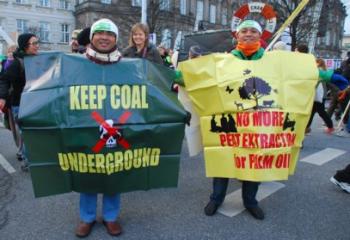- Home
- About
- Campaigns
- Regions
- Themes
- Agrofuels
- Climate justice
- Coastal communities and fisheries
- Disasters
- Economy & debt
- Energy
- Foreign investment
- Forests & forest fires
- Human rights
- Indigenous Peoples
- International Financial Institutions
- Land and food security
- Laws & regulations
- Mining, oil & gas
- Plantations
- Politics & democracy
- REDD
- Regional autonomy
- Transmigration
- Water and dams
- Women
- Publications
- Links
- Contact
Region
- Indonesia (67)
- Sumatra (22)
- Java, Madura & Bali (4)
- NTT & NTB (2)
- Kalimantan (14)
- Sulawesi (6)
- Maluku (2)
- Papua (20)
- Europe/UK (30)
- International (34)
Campaign
- Climate Justice and sustainable livelihoods (48)
- MIFEE (2)
- Agrofuels and oil palm plantations (17)
- Coal (8)
- BP - Tangguh (3)
Climate justice

Indonesian civil society protest in Copenhagen, December 2009

